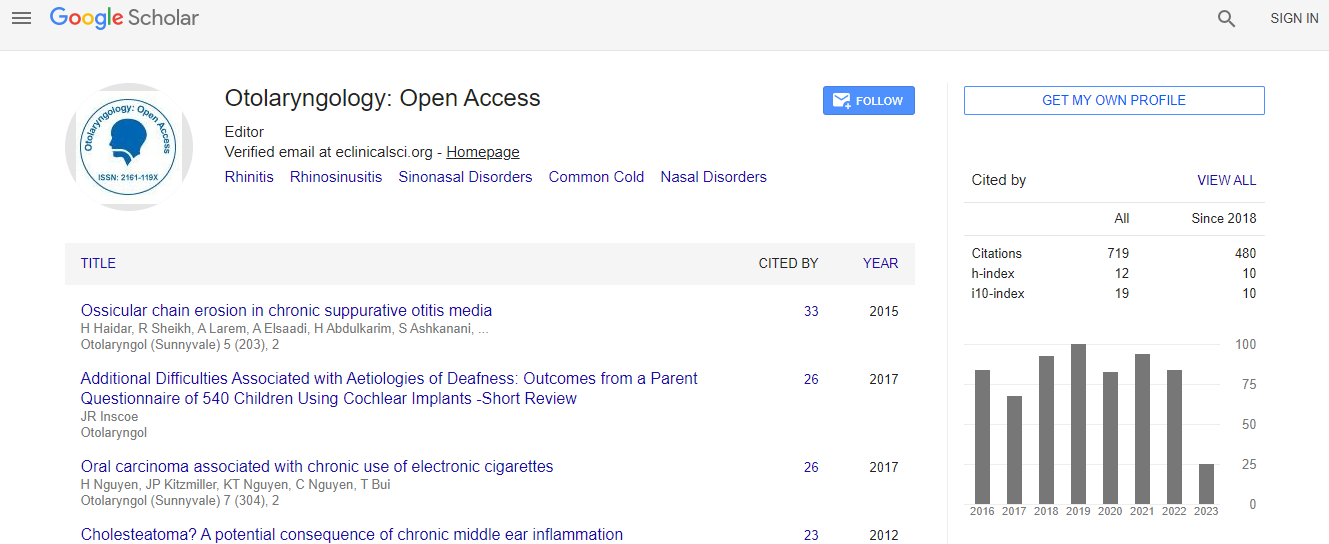Our Group organises 3000+ Global Conferenceseries Events every year across USA, Europe & Asia with support from 1000 more scientific Societies and Publishes 700+ Open Access Journals which contains over 50000 eminent personalities, reputed scientists as editorial board members.
Open Access Journals gaining more Readers and Citations
700 Journals and 15,000,000 Readers Each Journal is getting 25,000+ Readers
Google Scholar citation report
Citations : 925
Otolaryngology: Open Access received 925 citations as per Google Scholar report
Otolaryngology: Open Access peer review process verified at publons
Indexed In
- Index Copernicus
- Google Scholar
- Sherpa Romeo
- Open J Gate
- Genamics JournalSeek
- RefSeek
- Hamdard University
- EBSCO A-Z
- OCLC- WorldCat
- Publons
- Geneva Foundation for Medical Education and Research
- ICMJE
Useful Links
Recommended Journals
Related Subjects
Share This Page
Evaluation of selective & sustained auditory attention in children with attention deficit/ hyperactivity disorder (ADHD)
3rd International Conference and Exhibition on Rhinology & Otology
Amany Ahmed Shalaby, Wafaa El Kholi, Eman Abd El Badeh and Sana Mahran
Ain Shams University, Egypt Hearing and Speech Institute, Egypt Ministry of Health, Egypt
ScientificTracks Abstracts: Otolaryngology
Abstract
Background & Aims: The purpose of this study was to investigate whether children with ADHD may have a co-existing auditory attention disorder which may be a potential underlying cause for their impaired recognition in background noise and therefore their educational problems. Methods: A prospective study, in which sixty children diagnosed as having ADHD were examined. They were classified according to DSM-IV or its Arabic translation (ADHD-SC4) into three subgroups: 20 children were ADHD-HI, 20 children were ADHD-IA and 20 children were ADHD-C. The control group comprised twenty children, ranging in age from 5-12 years with normal hearing sensitivity, normal middle ear function, normal intelligence and good scholastic achievement. All children were subjected to history taking, basic audiological evaluation, ACPT test to measure sustained auditory attention, SPIN test and TEOAE suppression test to measure selective auditory attention. Results: ACPT test showed moderate sensitivity in diagnosing ADHD disorder, though it was efficient in ADHD sub-typing. Children with ADHD have poor selective auditory attention ability as shown by reduction in SPIN test scores in the three subgroups. ADHD children showed limited overall TEOAEs suppression which suggested medial OCB involvement. Conclusion: Management plan for ADHD should include strategies for selective as well as sustained auditory attentional abilities. And rehabilitation of ADHD children should be directed to enhance their auditory abilities rather than to depend on their visual perception which is more commonly affected.Biography
Amany Ahmed Shalaby, MD is the Professor of Audiology in Ain Shams University since 1994. She is the Member of International Auditory Physician Association (IAPA), Egyptian Otorhino-laryngology Society, Egyptian Audio-Vestibular Medical Society and Board Member in the Egyptian Audio-vestibular Medicine Association (EAVMA). She is a Certified Trainer of KAMPS method of Auditory Integration Training (AIT). She is a Reviewer in the ENT Committee for promotion of Professors and Assistant Professors and Reviewer of EJENTAS Journal and EJO Journal. She is specialized in diagnosis & management of hearing & balance disorders, main domain evaluation & management of children with learning disabilities, central auditory processing disorders (CAPD), Attention Deficit Hyperactive Disorder (ADHD), Autistic spectrum disorder.
Email: amani_shalaby@yahoo.com

 Spanish
Spanish  Chinese
Chinese  Russian
Russian  German
German  French
French  Japanese
Japanese  Portuguese
Portuguese  Hindi
Hindi 
